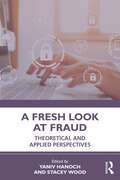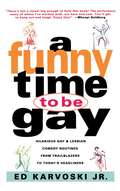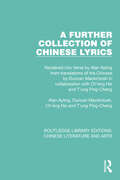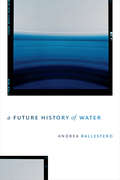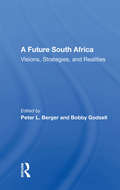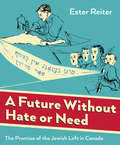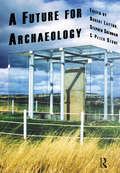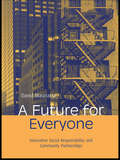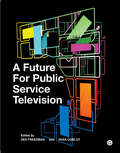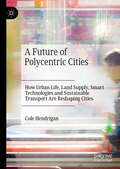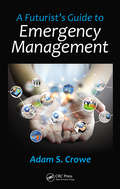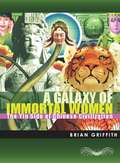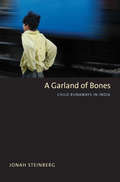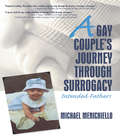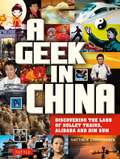- Table View
- List View
A Fresh Look at Fraud: Theoretical and Applied Perspectives
by Yaniv Hanoch Stacey WoodA Fresh Look at Fraud features psychologists, criminologists, and computer scientists to address the state-of-the-art research on the rising problem of fraud, scams, and financial abuse, stimulating a cross-disciplinary exchange of ideas, theories, methods, and practices. In this timely volume, Yaniv Hanoch and Stacey Wood bring together leading international researchers to discuss and review state-of-the-art research in fraud research, adopting diverse methodologies (from experimental to neuroimaging), perspectives, and questions. The book addresses topics such as mass marketing fraud, financial exploitation, ageing and cyber fraud, risk factors associated with becoming a fraud victim and online/cryptocurrency fraud. It offers a holistic picture of emerging trends and issues in fraud research and also includes discussion of the ‘Next Frontiers’ in research and important insights on how to create solutions. This book will be a crucial read for practitioners and researchers engaged in fraud research and other fields such as Forensic Psychology, Social Psychology, Criminal Behavior, and Criminology, as well as for postgraduates training in these fields.
A Frontier Doctor
by Henry F. HoytThis is the autobiography of the famous Henry F. Hoyt, a medical doctor and notable adventurer of the American West. His career started as a physician in the Goldrush town Deadwood, before moving west into the Texas Panhandle. He was by turns a Doctor, a Vigilante and a Cowboy, and he recounts stories of Charlie Siringo, John Chisum, Cole Younger, Billy The Kid, Jesse James, and many other figures of the Wild West. During the Spanish-American War he served as Chief Surgeon, was wounded and decorated in the Philippines, his life was one adventure after another. Illustrated with photographs.
A Full Account of the Dreadful Explosion of Wallsend Colliery by which 101 Human Beings Perished!
by AnonymousAn account of a devastating mining disaster, celebrating the 175th anniversary of The London LibraryAlthough (shallow) coal mining dates back as far as the 13th century, it was the development of the steam engine which began a huge increase in the amount of coal raised from the ground. Mining was difficult and there was constant danger from collapse, flooding and the presence of explosive gas. This account of the devastating explosion on the afternoon of 18th June 1835 makes powerful reading, reflecting in its simple language and direct reporting the reality of working life in the collieries at the time. In all, 102 of the 105 men and boys in the pit at the time of the explosion lost their lives; the two youngest boys killed were 8 and 9 years old.The books in "Found on the Shelves" have been chosen to give a fascinating insight into the treasures that can be found while browsing in The London Library. Now celebrating its 175th anniversary, with over seventeen miles of shelving and more than a million books, The London Library has become an unrivalled archive of the modes, manners and thoughts of each generation which has helped to form it.From essays on dieting in the 1860s to instructions for gentlewomen on trout-fishing, from advice on the ill health caused by the "modern" craze of bicycling to travelogues from Norway, they are as readable and relevant today as they were more than a century ago.
A Funny Thing Happened On The Way: Discover the 1960s trend for buying land on a Greek island and building a house. How hard could it be…?
by Nancy Spain<p>The superb classic memoir from a dazzlingly eccentric and endlessly fascinating author and feminist icon - a woman very much ahead of her time - including her time spent on the glorious island of Skiathos<p> <p>Nancy Spain was one of the most celebrated - and notorious - writers and broadcasters of the 50s and 60s. Witty, controversial and brilliant, she lived openly as a lesbian (sharing a household with her two lovers and their various children) and was frequently litigated against for her newspaper columns - Evelyn Waugh successfully sued her for libel... twice.<p> <p>Nancy Spain had a deep love of the Mediterranean. So it was no surprise when, in the 1960s, she decided to build a place of her own on the Greek island of Skiathos. With an impractical nature surpassed only by her passion for the project, and despite many obstacles, she gloriously succeeded. This classic memoir is infused with all Spain's chaotic brilliance, zest for life and single-minded pursuit of a life worth living.<p>
A Funny Thing Happened On The Way: Discover the 1960s trend for buying land on a Greek island and building a house. How hard could it be…?
by Nancy SpainThe superb classic memoir from a dazzlingly eccentric and endlessly fascinating author and feminist icon - a woman very much ahead of her time - including her time spent on the glorious island of Skiathos'A happy, hilarious book' Daily ExpressNancy Spain was one of the most celebrated - and notorious - writers and broadcasters of the 50s and 60s. Witty, controversial and brilliant, she lived openly as a lesbian (sharing a household with her two lovers and their various children) and was frequently litigated against for her newspaper columns - Evelyn Waugh successfully sued her for libel... twice.Nancy Spain had a deep love of the Mediterranean. So it was no surprise when, in the 1960s, she decided to build a place of her own on the Greek island of Skiathos. With an impractical nature surpassed only by her passion for the project, and despite many obstacles, she gloriously succeeded. This classic memoir is infused with all Spain's chaotic brilliance, zest for life and single-minded pursuit of a life worth living.Perfect for fans of A PLACE IN THE SUN and ESCAPE TO THE COUNTRY'Full of fun, and that zest of intelligence that never left her' Sunday Times
A Funny Time to Be Gay
by Ed KarvoskiIn A Funny Time to Be Gay, Ed Karvoski Jr. traces the evolution of gay and lesbian comedy from the few pioneers in New York's Greenwich Village in the seventies, to the mavericks who played San Francisco's famed Valencia Rose in the eighties, to the comics who starred in their own TV specials in the nineties and continue to headline comedy clubs. Among the more than 30 humorists spotlighted... · TOM AMMIANO - longtime San Francisco elected official · JUDY CARTER - three-time author including The Homo Handbook· KATE CLINTON - three-time author including Don't Get Me Started · SABRINA MATTHEWS - star of own Comedy Central special· BOB SMITH - three-time author including Openly Bob and star of own HBO special· JASON STUART - frequent TV guest appearances · ROBIN TYLER - performer, producer and proprietor of a women's cruise line· SUZANNE WESTENHOEFER - star of own HBO special · DANNY WILLIAMS - longtime MC at RSVP Cruises ... and more! "To the next generation of showbiz hopefuls who are gay or lesbian and choose not to hide it: make a grand entrance onto the comedy-club stages and television and film studios. The closet door has been set ajar. As any of these openly gay and lesbians comics will tell you, 'A funny thing happened on the way out of the closet!'"-- Ed Karvoski Jr., from author's introduction
A Furl of Fairy Wind
by Mollie HunterFour tales in which people encounter fairies and brownies for the first time.
A Further Collection of Chinese Lyrics: Rendered into Verse by Alan Ayling from translations of the Chinese by Duncan Mackintosh in collaboration with Ch'eng Hsi and T'ung Ping-Cheng (Routledge Library Editions: Chinese Literature and Arts #14)
by Alan Ayling Duncan MackintoshThis book, first published in 1969, builds on the authors’ first selection and contains a selection of Chinese lyrics (tz’u) mainly from Sung Dynasty poets who made this verse-form lastingly popular. Two of these poets, Su Shih and Hsin Ch’i Chi, add a fresh and robust note to the traditional theme of nostalgia and separation. As in the previous volume, the Chinese original, written with a scholar’s brush, faces the English translation.
A Future History of Water
by Andrea BallesteroBased on fieldwork among state officials, NGOs, politicians, and activists in Costa Rica and Brazil, A Future History of Water traces the unspectacular work necessary to make water access a human right and a human right something different from a commodity. Andrea Ballestero shows how these ephemeral distinctions are made through four technolegal devices—formula, index, list and pact. She argues that what is at stake in these devices is not the making of a distinct future but what counts as the future in the first place. A Future History of Water is an ethnographically rich and conceptually charged journey into ant-filled water meters, fantastical water taxonomies, promises captured on slips of paper, and statistical maneuvers that dissolve the human of human rights. Ultimately, Ballestero demonstrates what happens when instead of trying to fix its meaning, we make water’s changing form the precondition of our analyses.
A Future South Africa: Visions, Strategies, And Realities
by Peter L. Berger Bobby GodsellThis book identifies the key 'actors' whose visions and strategies are crucial to the pattern which change will take in South Africa. These actors, their visions and 'strategic logic' were subjected to a critique by their researchers in the light of contemporary South African 'realities'.
A Future Without Hate or Need: The Promise of the Jewish Left in Canada
by Ester ReiterDriven from their homes in Russia, Poland, and Romania by pogroms and poverty, many Jews who came to Canada in the wave of immigration after the 1905 Russian revolution were committed radicals. A Future Without Hate or Need brings to life the rich and multi-layered lives of a dissident political community, their shared experiences and community-building cultural projects, as they attempted to weave together their ethnic particularity—their identity as Jews—with their internationalist class politics.
A Future for Archaeology (UCL Institute of Archaeology Publications)
by Stephen Shennan Robert Layton Peter StoneOver the last thirty years issues of culture, identity and meaning have moved out of the academic sphere to become central to politics and society at all levels from the local to the global. Archaeology has been at the forefront of these moves towards a greater engagement with the non-academic world, often in an extremely practical and direct way, for example in the disputes about the repatriation of human burials. Such disputes have been central to the recognition that previously marginalized groups have rights in their own past that are important for their future. The essays in this book look back at some of the most important events where a role for an archaeology concerned with the past in the present first emerged and look forward to the practical and theoretical issues now central to a socially engaged discipline and shaping its future. This book is published in honor of Professor Peter Ucko, who has played an unparalleled role in promoting awareness of the core issues in this volume among archaeologists.
A Future for Everyone: Innovative Social Responsibility and Community Partnerships
by David Maurrasse Cynthia JonesThe original essays in this timely collection discuss the many ways to foster innovative and unprecedented collaborations leading to more effective partnerships between major institutions and corporations to poor and disenfranchised communities. Many of today's pressing issues are covered in-depth: bridging the digital divide; community reinvestment; university and corporate partnerships; and corporate responsibility.
A Future for Public Service Television (Goldsmiths Press Ser.)
by Vana Goblot Edited by Des FreedmanA guide to the nature, purpose, and place of public service television within a multi-platform, multichannel ecology.Television is on the verge of both decline and rebirth. Vast technological change has brought about financial uncertainty as well as new creative possibilities for producers, distributors, and viewers. This volume from Goldsmiths Press examines not only the unexpected resilience of TV as cultural pastime and aesthetic practice but also the prospects for public service television in a digital, multichannel ecology. The proliferation of platforms from Amazon and Netflix to YouTube and the vlogosphere means intense competition for audiences traditionally dominated by legacy broadcasters. Public service broadcasters—whether the BBC, the German ARD, or the Canadian Broadcasting Corporation—are particularly vulnerable to this volatility. Born in the more stable political and cultural conditions of the twentieth century, they face a range of pressures on their revenue, their remits, and indeed their very futures. This book reflects on the issues raised in Lord Puttnam's 2016 Public Service TV Inquiry Report, with contributions from leading broadcasters, academics, and regulators. With resonance for students, professionals, and consumers with a stake in British media, it serves both as historical record and as a look at the future of television in an on-demand age.Contributors includeTess Alps, Patrick Barwise, James Bennett, Georgie Born, Natasha Cox, Gunn Enli, Des Freedman, Vana Goblot, David Hendy, Jennifer Holt, Amanda D. Lotz, Sarita Malik, Matthew Powers, Lord Puttnam, Trine Syvertsen, Jon Thoday, Mark Thompson
A Future for the Past: Petrie's Palestinian Collection (UCL Institute of Archaeology Publications)
by Stuart LaidlawFlinders Petrie, known for his extensive work in Egypt, was also a pioneer of scientific archaeology in Palestine early in the 20th century through his excavations at Tell el-Hesi, Tell el-‘Ajjul, and elsewhere. This volume offers a critical analysis of Petrie’s contributions to the archaeology of Palestine and the role his collection of artifacts plays in modern studies of the ancient Near East. It also includes a full color catalog of 270 objects, dating from Chalcolithic to Ottoman times, excavated by Petrie.
A Future of Polycentric Cities: How Urban Life, Land Supply, Smart Technologies and Sustainable Transport Are Reshaping Cities
by Cole HendriganIn this book, Dr Cole Hendrigan examines the options for sustainable transport and land-use planning based on building heights, mixes of land-use, transportation mode capacity and others to build the next generation of parks, housing, commercial and retail spaces along high-capacity rail corridors. Following the paradigm of ‘Transit Oriented Development’, Dr Hendrigan provides unique knowledge and insights on how to best make the transition towards more sustainable and livable cities, offering a practical method to better integrate transport and urban development to this end.
A Futurist's Guide to Emergency Management
by Adam S. CroweA Futurist's Guide to Emergency Management provides interdisciplinary analysis on how particular sets of conditions may occur in the future by evaluating global trends, possible scenarios, emerging conditions, and various other elements of risk management. Firmly based in science, the book leverages historical data, current best practices, and scie
A Galaxy of Immortal Women
by Brian GriffithForeWord Reviews Mother's Day Staff Pick: "Books Mom Will Love""A valuable historical reference guide." -Publishers Weekly"This is a very ambitious and timely book, a book that many historians, literary theorists and story tellers who care about China and its "Other Half of the Sky" want to write, but Brian Griffith did it first, with such scope, ease and fun." -WANG PING, author of The Last Communist Virgin and Aching for Beauty: Footbinding in China"This book is a most engaging and entertaining read, and the depth of its scholarship is astounding. Griffith vividly describes the counterculture of Chinese goddesses, shows that their fascinating stories are alive and active today, and points us toward a more inclusive and caring partnership future." -RIANE EISLER, author of The Real Wealth of Nations: Creating a Caring Economics and The Chalice and the Blade: Our History, Our FutureTouching on the whole story of China-from Neolithic villages to a globalized Shanghai-this book ties mythology, archaeology, history, religion, folklore, literature, and journalism into a millennia-spanning story about how Chinese women-and their goddess traditions-fostered a counterculture that flourishes and grows stronger every day.As Brian Griffith charts the stories of China's founding mothers, shamanesses, goddesses, and ordinary heroines, he also explores the largely untold story of women's contributions to cultural life in the world's biggest society and provides inspiration for all global citizens.Brian Griffith grew up in Texas, studied history at the University of Alberta, and now lives just outside of Toronto, Ontario. He is an independent historian who examines how cultural history influences our lives, and how collective experience offers insights for our future.
A Game for Rough Girls?: A History of Women's Football in Britain
by Jean WilliamsCan we truly call football England's 'national' game?How have we arrived at this point of such clear inequality between men's and women's football? Between 1921 and 1972, women were banned from playing in football League grounds in the UK. Yet in 1998 FIFA declared that "the future is feminine" and that football was the fastest growing sport for women globally. The result of several years of original research, the book traces the continuities in women's participation since the beginnings of the game, and highlights the significant moments that have influenced current practice. The text provides: *insight into the communities and individual experiences of players, fans, investors, administrators and coaches*examination of the attitudes and role of national and international associations*analysis of the development of the professional game*comparisons with women's football in mainland Europe, the USA and Africa. A Game for Rough Girls is the first text to properly theorize the development of the game. Examining recreational and elite levels, the author provides a thorough critique, placing women's experience in the context of broader cultural and sports studies debates on social change, gender, power and global economics.
A Game of Their Own: Voices of Contemporary Women in Baseball
by Jennifer RingIn 2010 twenty American women were selected to represent Team USA in the fourth Women’s Baseball World Cup in Caracas, Venezuela; most Americans, however, had no idea such a team even existed. A Game of Their Own chronicles the largely invisible history of women in baseball and offers an account of the 2010 Women’s World Cup tournament. Jennifer Ring includes oral histories of eleven members of the U.S. Women’s National Team, from the moment each player picked up a bat and ball as a young girl to her selection for Team USA. Each story is unique, but they share common themes that will resonate with young female players and fans alike: facing skepticism and taunts from players and parents when taking the batter’s box or the pitcher’s mound, self-doubt, the unceasing pressure to switch to softball, and eventual acceptance by their baseball teammates as they prove themselves as ballplayers. These racially, culturally, and economically diverse players from across the country have ignored the message that their love of the national pastime is “wrong.” Their stories come alive as they recount their battles and most memorable moments playing baseball—the joys of exceeding expectations and the pleasure of honing baseball skills and talent despite the lack of support. With exclusive interviews with players, coaches, and administrators, A Game of Their Own celebrates the U.S. Women’s National Team and the excellence of its remarkable players. In response to the jeer “No girls allowed!” these are powerful stories of optimism, feistiness, and staying true to oneself.
A Game of Two Halves: Football Fandom, Television and Globalisation (Comedia)
by Cornel SandvossProfessional football is one of the most popular television 'genres' worldwide, attracting the support of millions of fans, and the sponsorship of powerful companies. In A Game of Two Halves, Sandvoss considers football's relationship with television, its links with transnational capitalism, and the importance of football fandom in forming social and cultural identities around the globe. He presents the phenomenon of football as a reflection postmodern culture and globalization.Through a series of case studies, based in ethnographic audience research, Sandvoss explores the motivations and pleasures of football fans, the intense bond formed between supporters and their clubs, the implications of football consumption on political discourse and citizenship, football as a factor of cultural globalisation, and the pivotal role of football and television in a postmodern cultural order.
A Garland of Bones: Child Runaways in India (Yale Agrarian Studies Series)
by Jonah SteinbergAn intimate portrait of India’s child runaways, and the sociopolitical forces shaping their lives This intimate portrait examines the tracks, journeys, and experiences of child runaways in northern India. Jonah Steinberg situates children’s decisions to leave home and flee for the city in their larger cultural, social, and historical contexts, and considers histories of landlessness and debt servitude in narratives of child dislocation. The resulting work is an original perspective on the sociological trends in postcolonial India and a unique treatment of a population of individuals who live on the margin of society.
A Garland of Feminist Reflections: Forty Years of Religious Exploration
by Rita M. GrossRita M. Gross has long been acknowledged as a founder in the field of feminist theology. One of the earliest scholars in religious studies to discover how feminism affects that discipline, she is recognized as preeminent in Buddhist feminist theology. The essays in A Garland of Feminist Reflections represent the major aspects of her work and provide an overview of her methodology in women's studies in religion and feminism. The introductory article, written specifically for this volume, summarizes the conclusions Gross has reached about gender and feminism after forty years of searching and exploring, and the autobiography, also written for this volume, narrates how those conclusions were reached. These articles reveal the range of scholarship and reflection found in Rita M. Gross's work and demonstrate how feminist scholars in the 1970s shifted the paradigm away from an androcentric model of humanity and forever changed the way we study religion.
A Gay Couple's Journey Through Surrogacy: Intended Fathers
by Jerry Bigner Michael MenichielloA deeply personal account of the trials and tribulations of the surrogacy journey!Surrogacy&’s been coldly and unjustifiably called "baby buying" and "baby selling" and many states have banned it. But those insensitive terms do not tell the inspiring tale of a couple fiercely wanting to become parents. A Gay Couple&’s Experience with Surrogacy: Intended Fathers is the moving true story of a gay couple&’s decision to have their child through a surrogate mother. With humor and emotion, the author traces their intense experience from the initial decision to have a child through surrogacy on through the entire pregnancy and birth.A Gay Couple's Journey Through Surrogacy chronicles this couple&’s no-holds-barred account of the emotional toll, the legal matters, the financial concerns, and the ultimate fulfillment of parenting a child. A Gay Couple's Journey Through Surrogacy reveals the author&’s answers to these questions: why surrogacy over adoption? which type of surrogacy-traditional or gestational? what were the issues when choosing a surrogate? how much does surrogacy cost? what living expenses are included in the cost? what are the emotional and financial reasons that surrogates choose to bear another&’s child? what are the pitfalls in choosing surrogacy? what are the legal issues-what to beware and what to considerAn excerpt:Before I knew it, I was writing an ad of my own, and I actually posted it. David, of course, had no idea what I was up to. The ad read:"We&’re a gay couple in New York that just celebrated our fourteenth anniversary and we&’ve decided to extend our family. We&’re looking for someone close by and even have a separate apartment available if needed."Nice, huh? Could it be just a little bit more. . . vague? Could my ad have lacked a little more personality? Sure, have our baby and move right in while you&’re doing it! Who the hell would respond to that? I wasn&’t even sure after reading it myself that it made any sense. But what should I have said? What could I have said? I scrambled to find a way to delete it, but couldn&’t.A Gay Couple's Journey Through Surrogacy is a touching memoir that reveals the challenges that face gay and lesbian couples who may be considering either adoption or surrogacy.
A Geek in China: Discovering the Land of Alibaba, Bullet Trains and Dim Sum
by Matthew B. ChristensenFor every fan of kung fu, steamed dumplings, Confucius and giant skyscrapers, A Geek in China is a hip, smart and concise guide to the Middle KingdomPacked with photographs and short articles on all aspects of Chinese culture, past and present, A Geek in China introduces readers to everything from Taoism and Confucianism to pop music and China's new middle class. A mix of traditional culture, such as highlights of Chinese history, great historical and mythological figures, traditional medicine, how the Chinese language works, real Chinese food, martial arts, and how the Chinese Communist Party works, is complimented with information on what makes China unique today.Chapters discuss why China is so crowded, what it's like to work in an office, internet and cell phone culture, dating and marriage practices, top popular movies and movie stars, the contemporary art scene, China's amazing new architecture and infrastructure, and popular holidays. It also contains chapters on what makes the Chinese tick, such as the importance of harmony in society, the practice of humility, and the importance of hierarchy. For visitors to the country, the author includes sections on what to see, both common cultural sites and off-the-beaten-track sites.
